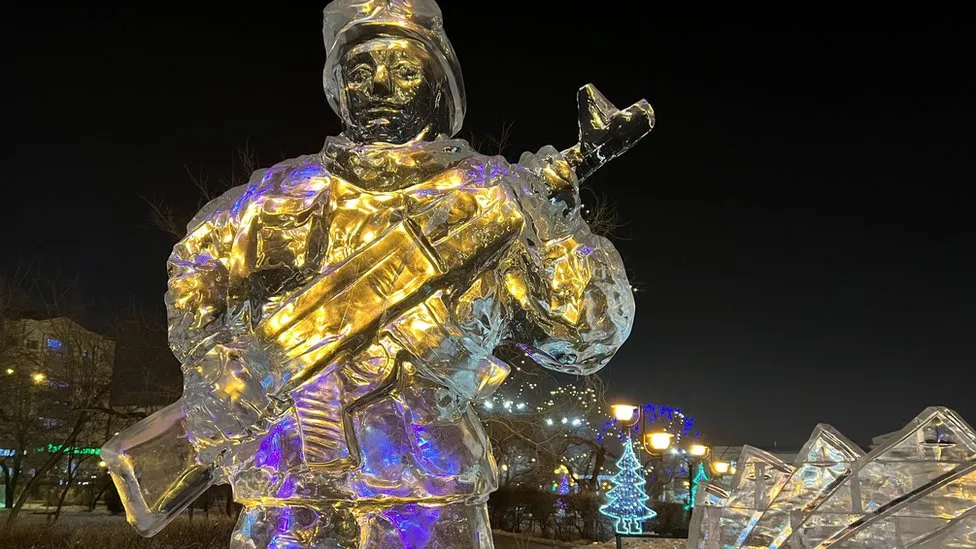Ice soldiers mark Russia's very patriotic Christmas
A dozen Russian soldiers armed with Kalashnikovs stand motionless on the main square of the Siberian city of Chita.
Add in the wind chill factor and it's -33C. I'm bundled up in multiple layers of clothes, but I can feel my face freezing.
As people walk past, they stop and stare at the servicemen. Some of them take selfies.
There's a good reason why the soldiers aren't moving a muscle. They're made of ice.
Chita lies 3,000 miles (4,830km) east of Moscow. The local authorities decided that militarised ice sculptures would be an appropriate decoration for this festive season; a way of encouraging a patriotic new year. Most of the people I talk to on the square approve.
"We're fighting a war," Tatyana says, "so it's right to have these ice soldiers here. They're topical."
"It's an unusual way of celebrating the New Year," Ludmila tells me. "Normally you'd have Santa Claus, bunny rabbits or squirrels. But it's a sign of the times."
Ludmila admits she's worried by what's happening in Ukraine.
"We've got friends who've been mobilised and sent to fight there. We worry about them. We call to see if they're OK. But whatever we may think of our government, our motherland is our motherland. If we don't defend it, who will?"
"Defend it from what? From whom?" I ask Ludmila. After all, on 24 February it was Russia that launched a full-scale invasion of Ukraine. Not the other way around.
"Defend it from Nazis. There are a lot of them around," Ludmila replies. "Russia's being attacked on all fronts, including with LGBT propaganda. They're trying to force this upon us. We reject these alien ideas. We embrace Russian values. It's hard for me to explain this in words. I just feel it."
Russians never used to say these kinds of things to me on the street. They never talked about feeling threatened by "Nazis" in Ukraine, or about the need to fight for so-called "Russian values". It's one of the biggest changes I've noticed here this year.
Having established total control of the media landscape in Russia, Kremlin propaganda has managed to convince many Russians that their country is now in some existential battle with the West. In conversations here now, I often hear people repeat - almost word for word - the anti-Ukrainian and anti-Western rhetoric they hear on Russian TV channels.
You might think that people in Chita would have more pressing concerns than repelling the onslaught of "Western values". Despite Siberia enjoying huge gas reserves, the city of Chita has still not been connected to Russia's domestic gas network. From the hills above the city you can see clouds of smoke rising from coal-fired power stations and from the myriad of wooden houses that are still heated by firewood.
This winter, comfort and joy feel in short supply in Chita. But there's patriotism aplenty. Outside the local concert hall, a stylised metal snowman is holding a Russian tricolour. On Lenin Square, the decorated fir tree shares centre stage with big signs bearing the letter "Z" - the symbol of the Kremlin's "special military operation" in Ukraine. Watch the news on Chita TV, and you'll see reports about local schoolchildren writing festive letters - not to Father Christmas, but to Russian soldiers in Ukraine.
But not everyone in Chita shares this particular interpretation of patriotism.
Across town I meet Ivan Losev. On social media recently, the 26-year-old sauna owner shared a bizarre dream he'd had in which he'd met President Volodymyr Zelensky of Ukraine.
"I dreamt I'd been mobilised and sent to a training camp," recalls Ivan. "Suddenly the Ukrainian army, led by Zelensky, attacked. Everyone was captured. They were about to shoot us, when Zelensky pointed to me. 'I've seen your Instagram stories. Glory to Ukraine!' he said. 'Glory to the Heroes!' I replied."
For posting about his dream - and for other comments he'd made on social media about the "special military operation" - Ivan was taken to court and fined 30,000 roubles (approximately £380) for "discrediting the Russian armed forces."
"The closer you get to the downfall of an empire, the more stupid the laws become," Ivan tells me. "I think this will end with the downfall of Putin's Russia.
"Patriotism is loving your country, but criticising it to bring change. Patriotism is wanting to make your city better so that it prospers. So that people want to stay and live there and live well. But Russia's patriotism is about bombing Ukraine to pieces. Our leaders don't want our country to be better. They just want people in another country to live worse."
As I head back to the city centre, I pass another ice sculpture of a serviceman who has been left to guard a bus stop. By now it's dark. The new year illuminations have been switched on and are casting a multi-coloured glow over Lenin Square. It's such a bizarre sight. And rather unnerving. As the fairy lights change colour, so do the ice soldiers with their automatic rifles.
It may be an attempt to foster a festive feel-good factor. But as this dramatic year nears the end, what exactly do Russians have to celebrate?
Certainly not peace on Earth.
"I worry that Russia will suffer from what is happening now," says Margarita, with whom I get chatting on the square.
"At the end of the day I would like there to be peace. I would like there to be no wars. We can do without those. But what will be will be."
https://www.bbc.com/news/world-europe-64026344





Post a Comment